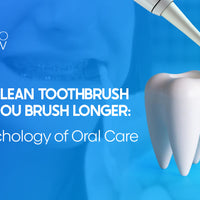We often think visiting the dentist is just about keeping our teeth clean, but your mouth is actually the gateway to your entire body. The condition of your gums and teeth can reveal, and even influence, the state of your overall health.
Scientific research continues to show that poor oral hygiene goes far beyond cavities and bad breath. When bacteria and inflammation from your mouth enter the bloodstream, they can quietly fuel serious health problems, including heart disease, diabetes complications, and even cognitive decline.
How Gum Disease Triggers Bigger Trouble
Here’s how it happens.
When your gums are swollen, tender, or bleeding, it’s often a sign of gingivitis or periodontal disease. These tiny openings in your gum tissue act like doorways, letting oral bacteria slip into your bloodstream— that is bacterial entry. Stage 1.
Stage 2: the systemic inflammation starts.
Once there, your body detects these bacteria as intruders. It triggers an inflammatory response to fight them off. But when this inflammation becomes chronic and low-grade, it doesn’t just stay in your mouth; it spreads throughout your body, silently affecting your heart, brain, kidneys, and other organs. That’s when Stage 3 begins—
The Major Health Impacts
When oral bacteria and inflammation spread, they can affect your body's most vital systems.
1. Heart Disease and Stroke
This is one of the most well-established and serious links. Inflammation that begins in your gums can extend to your cardiovascular system.
Bacteria irritate the lining of your arteries and promote plaque buildup, which restricts blood flow. This hardening of the arteries (atherosclerosis) increases the risk of blockages.
Research shows that individuals with gum disease are nearly twice as likely to develop coronary artery disease and have 28% risk of heart attack compared to those with healthy gums.
2. Diabetes
The connection between oral health and diabetes creates a vicious cycle where each condition worsens the other.
Diabetes weakens the body’s ability to fight infection, increasing the risk of severe gum disease.
In turn, inflammation from gum disease makes it harder for the body to use insulin effectively, disrupting blood sugar control. It’s a constant struggle for stability.
Studies show that up to 95% of adults with diabetes also have some form of periodontal disease.
3. Respiratory Infections
You can breathe in troubles from your mouth. Literally.
Bacteria from infected gums and teeth can be inhaled into the lungs, leading to conditions like pneumonia and bronchitis, or worsening chronic illnesses such as COPD.
4. Pregnancy Complications
For expectant mothers, maintaining excellent oral health is crucial for a healthy pregnancy.
Bacteria and inflammation from severe gum disease can enter the placental bloodstream, potentially triggering premature labor or low birth weight.
Women with gum disease face up to six times the risk of preterm delivery compared to those with healthy gums.
5. Dementia and Alzheimer's Disease
Emerging research reveals a concerning link between poor oral health and cognitive decline.
A recent review found that certain oral bacteria were consistently associated with Alzheimer’s disease and mild cognitive impairment in older adults. These findings suggest that harmful oral microbes may contribute to brain inflammation, potentially accelerating memory loss and cognitive deterioration.
Other Significant Risks
Chronic inflammation stemming from poor oral hygiene can contribute to several other systemic health issues:
Autoimmune Health: May aggravate conditions like rheumatoid arthritis by intensifying joint inflammation.
Kidney Health: Persistent inflammation can impair kidney function.
Certain Cancers: Links have been found between gum disease and increased risks of pancreatic, lung, and oral cancers.
A Simple Oral Hygiene Routine
These risks are largely preventable. With a few consistent habits, you can protect both your mouth and overall health.
Brush Effectively: Brush twice daily for two minutes using fluoride toothpaste. Tools like the SonicPro UV help maintain proper technique.
Floss Daily: Essential for cleaning between teeth and under the gumline where bacteria hide.
Regular Dental Visits: Get professional cleanings every six months to remove tartar and detect issues early.
Healthy Diet: Limit sugary foods and drinks that feed harmful bacteria.
Don't Smoke: Smoking is a leading cause of gum disease and oral cancer.
Hydrate: Water helps wash away food particles and bacteria.
FAQs About Oral Health
What is the single most effective thing I can do to prevent systemic problems?
Flossing daily. It removes plaque between teeth and under the gumline, cutting off bacteria before it enters the bloodstream.
If I have bleeding gums, should I see my doctor or my dentist?
See your dentist immediately. Bleeding gums are an early sign of gingivitis or periodontitis. Your dentist can treat the infection and help reduce systemic inflammation.
Does using an electric toothbrush like the SonicPro UV actually help with gum disease?
Yes. Electric toothbrushes with oscillating or sonic motion remove more plaque and reduce gingivitis more effectively than manual brushes, making them excellent for controlling inflammation.
Can oral bacteria really cause a stroke?
Not directly, but it contributes to risk. Bacteria entering the bloodstream can cause arterial inflammation and plaque buildup, which can narrow arteries and increase the risk of heart attacks and strokes.
Conclusion
Your oral health is inextricably linked to your overall health—neglecting one harms the other!
Treat oral care not as a cosmetic habit but as essential preventive medicine. With tools like the SonicPro UV and regular dental checkups, you can protect your smile and your overall well-being.
Schedule your dental check-up and cleaning today; it could be one of the most important health decisions you make this year!






